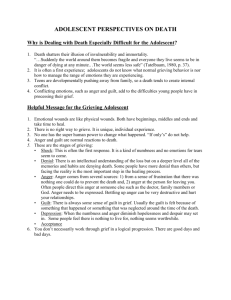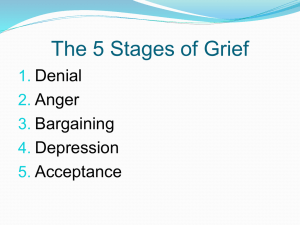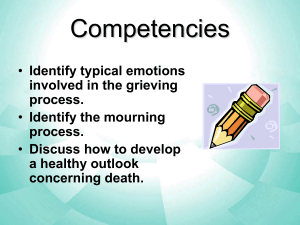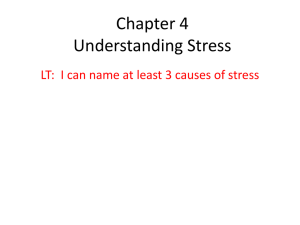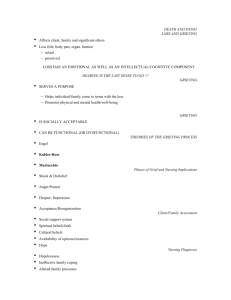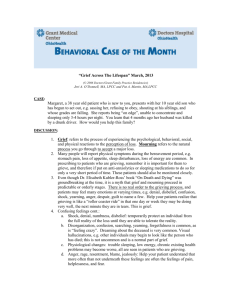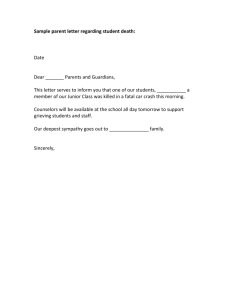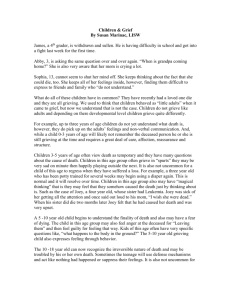Developmental Issues of Grieving Children
advertisement
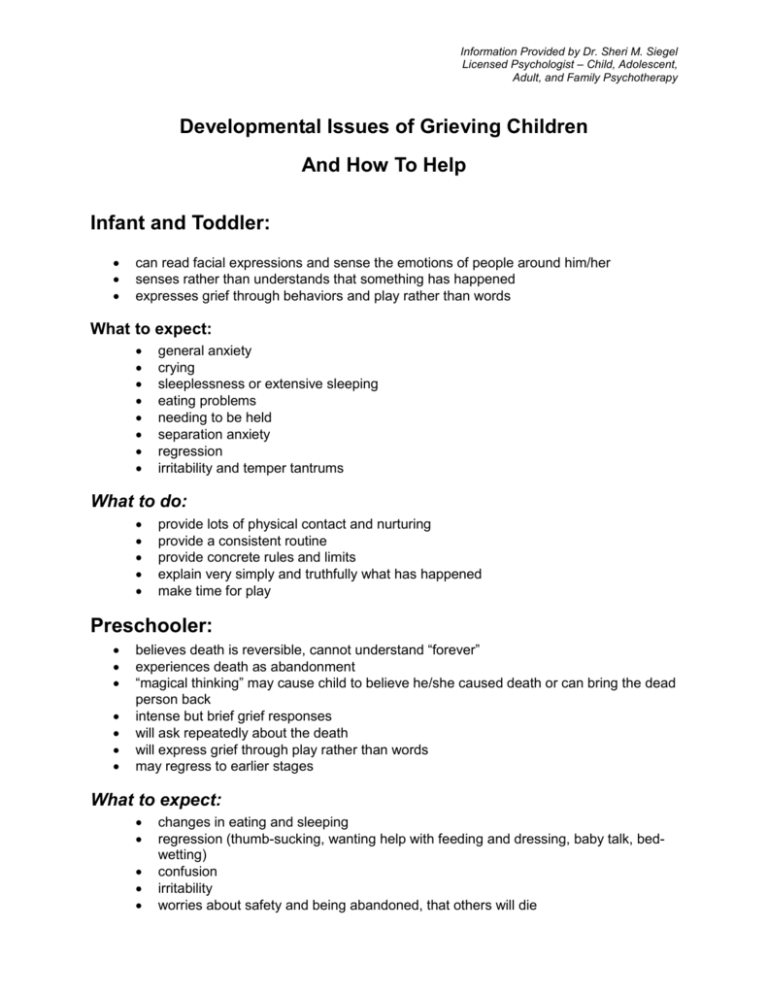
Information Provided by Dr. Sheri M. Siegel Licensed Psychologist – Child, Adolescent, Adult, and Family Psychotherapy Developmental Issues of Grieving Children And How To Help Infant and Toddler: can read facial expressions and sense the emotions of people around him/her senses rather than understands that something has happened expresses grief through behaviors and play rather than words What to expect: general anxiety crying sleeplessness or extensive sleeping eating problems needing to be held separation anxiety regression irritability and temper tantrums What to do: provide lots of physical contact and nurturing provide a consistent routine provide concrete rules and limits explain very simply and truthfully what has happened make time for play Preschooler: believes death is reversible, cannot understand “forever” experiences death as abandonment “magical thinking” may cause child to believe he/she caused death or can bring the dead person back intense but brief grief responses will ask repeatedly about the death will express grief through play rather than words may regress to earlier stages What to expect: changes in eating and sleeping regression (thumb-sucking, wanting help with feeding and dressing, baby talk, bedwetting) confusion irritability worries about safety and being abandoned, that others will die What to do: give simple, concrete explanations repeat as often as asked include child in funeral or memorial ritual encourage play accept expressions of anger be consistent in routines allow regression provide lots of physical closeness and nurturing read story books about death and loss Elementary School Age Child: has lots of questions about how life will be different, how the person died, what happened to the body, etc. may express wish to be with the dead person beginning to understand death is permanent may worry about own death and death of others may feel guilty about the death difficulty staying focused in school and completing assignments trouble sleeping, nightmares What to expect: regression fighting, anger trouble paying attention, daydreaming withdrawn sleepiness trouble completing school assignments What to do: be truthful, clear, accurate with explanations encourage expression through art, journaling, music encourage physical activities maintain routines and structure but be flexible encourage expression of feelings Middle School Age Child: already experiencing physical and hormonal changes physical symptoms (headaches, stomachaches, sleeping problems, eating changes) range of emotions does not want to be treated differently more verbal but still needs physical outlets understand death as final and unavoidable may increase risk-taking behaviors feels helpless and hopeless 2 What to expect: arguments, anger, fighting withdrawal inability to concentrate risk-taking behavior such as stealing, using drugs, premature sex moodiness and inconsistent reactions What to do: accept mood swings be supportive and encourage sharing accept increase in physical concerns encourage support from a number of sources including group support listen and don’t be afraid to model healthy grieving High School Adolescent: adult understanding of death, that death is universal, inevitable, irreversible yet believes death won’t happen to him/her depression, denial, anger risk-taking and acting out behaviors indicate challenging death fights against needing help because he/she wants to be independent death is romanticized—not really in touch with the finality of death What to expect: withdrawal from parent and other adults anger increased risk-taking pushing limits lack of concentration increased time with friends sadness What to do: listen encourage expression of feeling be truthful and factual in explanations model appropriate grieving responses be flexible Above information was taken from: Helping the Grieving Student: A Guide for Teachers from the Doughy Center Helping Children Cope with Death from the Doughy Center How Do We Tell the Children? by Dan Schaeffer and Christine Lyons The Grieving Child by Helen Fitzgerald 3 WAYS TO HELP A TRUAMATIZED CHILD/ADOLESCENT* Do not be surprised by any significant changes in behavior or personality. Be more nurturing and comforting. Pay more attention, spend more time. Provide consistent care with younger children. Let them know where you are going, when you’ll be back. If you are gone for several hours, call and let them know you are all right. Permit them to talk about it if they want to. Encourage them to let you know when they are thinking about it or when new reactions occur. Normalize (explain) the reactions they have and are likely to have and, given their experience, how normal these reactions are. Provide labels, especially for younger children, for the feelings they are having, i.e., sad, afraid, etc. Inform teachers so they do not misinterpret the child’s different behavior as something it is not. Be patient with difficulties in concentration, completing school work or other tasks. Limit tasks. Keep them simple. Be patient with regressive behavior such as nail biting, thumb sucking. If their behaviors or changes in personality scare you consult with a trauma specialist, but also reinforce that you understand that these are a result of their experience. Share their concerns for safety, but be realistic. Help them not to generalize. Remind them as needed that “that (incident) was then” and this is now and things have changed. Understand that new physical reactions such as headaches, fatigue, etc., are in response to overwhelming fears and their attempts to avoid them. Help them share their fears and worries. Help them understand the relationship between their anger and their trauma and find safe ways they can discharge their anger, ie., draw, write,talk about it, exercise, etc. 4 Help them hold onto positive memories of the victim, especially during their most difficult days. Do not hurry their reactions along by saying, “It’s time to get over it.” Share your own trauma or frightening experiences. (“You survived; they can too” is the unspoken message when you share your experiences). Help them understand that their now angry, defiant, aggressive behavior, staying away from home or taking unnecessary risk is a way to avoid feeling the pain, the hurt, the terror they experienced. Avoiding, however, will hurt them more. Help them talk about what they think could have been differently. Emphasize, if they are feeling shame or guilt, that no one ever taught them to react in such a situation, they did not choose for it to happen and they are not responsible. If shame is tied to a physical reaction during the event such as wetting pants, vomiting, crying, etc., assure them that unlike television portrayals, most people faced with terror will lose control over their bodies. If they are talking about revenge, ask about their plan and talk about realistic responses. Then provide additional ways to not let revenge take control of their life and to better help them with the pain. Ask for help with this. If children express that they are not afraid of anything anymore, “nothing scares me,” be more protective of them as they will not act safely in a potentially dangerous situation with others who put them at risk. From The Institute for Trauma and Loss in Children (TLC) 5

